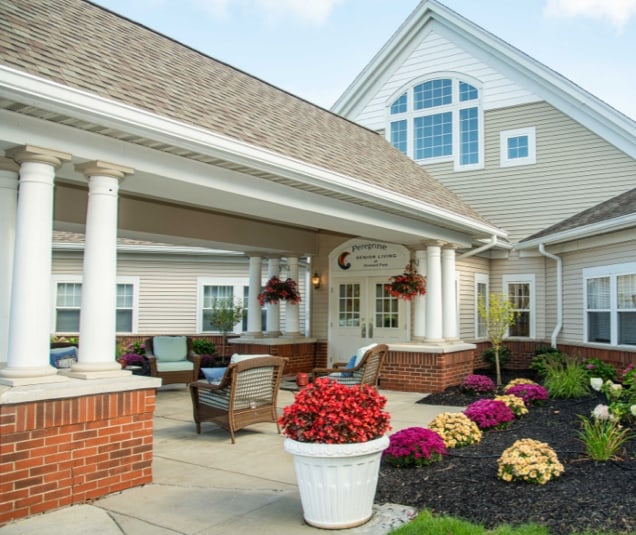There is, in fact, assisted living available for seniors living with memory loss conditions. Such communities are typically referred to as memory care.
Memory care provides a specialized environment tailored to supporting those with cognitive conditions. It’s designed to create a space where residents feel safe, respected, and encouraged to continue growing.
Understanding Memory Care
Memory care is a specialized type of assisted living designed for seniors with Alzheimer’s, dementia, or other cognitive conditions. These communities focus on creating a structured environment with 24/7 support, robust safety measures, and engaging programs to help residents feel connected and supported.
The goal is to provide care that recognizes each resident, focusing on their quality of life by providing them with a fulfilling lifestyle that stimulates memory, encourages social connections, and promotes well-being.
When Should Memory Care be Considered?
Determining the right time for memory care is often a deeply emotional decision. Here are some signs that it might be time to consider memory care for your loved one:
- Increased confusion or disorientation: Frequent confusion, disorientation, or wandering can signal that a more supportive environment may be beneficial.
- Challenges with daily tasks: Difficulty with bathing, dressing, meal preparation, and medication management may indicate the need for a higher level of care.
- Safety concerns: Repeated falls, forgetfulness about appliances, or missed medications can show that more supervision is needed.
- Social withdrawal: Memory loss can lead to feelings of loneliness and isolation, which a memory care community can help to alleviate with social activities and engagement.
How is Memory Care Different from Assisted Living?
While memory care and assisted living both provide support for seniors, they’re designed to meet different sets of needs.
Memory care communities are specifically tailored for those experiencing cognitive conditions. They offer a structured environment with secure areas to prevent wandering; they provide low-stimulation layouts; and they design their safety protocols to provide families with peace of mind.
Additionally, staff in memory care communities are trained to understand the needs and behaviors associated with dementia. This means approaching residents with the empathy and patience that they deserve.
While assisted living focuses on providing support with the activities of daily living, memory care is uniquely tailored to address the cognitive changes of seniors living with dementia. Programs in memory care, such as life-enrichment activities and memory exercises, are carefully planned to help stimulate cognitive function, preserve memory, and maintain social connections.
At Peregrine, we offer signature programs through our philosophy, The Peregrine Way, which includes spiritually and intellectually enriching activities to promote well-being.
Another distinction between these two forms of care lies in their approach to daily interactions and routines. Memory care communities focus on each resident’s history and interests, ensuring every experience is meaningful and personalized. Whether through customized meals, gentle daily routines, or pet-friendly environments, memory care offers a comforting blend of familiarity and compassion, making your loved one feel truly at home.
Preparing for Memory Care
When considering memory care for a loved one, it’s essential to approach the process with thoughtfulness, empathy, and understanding. Here’s how you can take the steps to prepare:
- Begin with a family conversation: The first step is to discuss memory care openly with your loved one and other family members. This conversation should focus on your loved one’s needs and the benefits of memory care, such as personalized support, safety, and opportunities for maintaining independence. It’s important to approach this discussion compassionately, ensuring that your loved one feels heard and respected. Emphasize that memory care is not about removing independence but providing the right level of support so they can continue living a fulfilling life.
- Research options: Take the time to research different memory care communities to find one that best aligns with your loved one’s personality, preferences, and needs. Look for communities with a strong reputation for care that offer specialized programs like cognitive enrichment, wellness activities, and emotional support.
- Visit communities: Touring communities in person is one of the most crucial steps in the process. During these visits, observe the environment, staff interactions, and how the community supports residents with memory challenges. Pay attention to the cleanliness, safety features, and overall atmosphere. You’ll also have the chance to ask questions and meet with staff members who can share insights about their approach to care.
- Plan the transition together: Transitioning to memory care can be challenging, so it’s important to include your loved one in the decision-making as much as possible. This can involve discussing what to expect during the move, explaining how the community can support them in daily activities, and reassuring them about the positive aspects of the transition.
- Create a familiar space: When it’s time to move, make the transition easier by bringing personal items from home to help your loved one feel more comfortable in their new environment. These could include cherished photographs, favorite blankets, or beloved books. Familiar objects can provide emotional comfort and a sense of continuity, making the space feel more like home. Encouraging them to personalize their room can help maintain a connection to their past and establish a sense of belonging in their new community.
Thoughtful planning and open communication will help make the transition to memory care a positive and empowering experience.
Explore Memory Care Options with Peregrine Senior Living
If you’re considering memory care for a loved one, Peregrine Senior Living is here to help. Our compassionate team and thoughtfully designed programs ensure each resident feels seen, understood, and supported.
Contact us today to learn more about our memory care options and to schedule a tour of one of our welcoming communities.












I was honored to celebrate the achievements of an outstanding resident today; gratitude is expressed to Barb's family and friends for making it a memorable celebration. Thanks to Gary for his special contribution  ... See MoreSee Less
1 CommentsComment on Facebook
Dining at our community is about more than what’s on the plate—it’s about connection, community, and the joy of gathering together.
Our talented culinary team crafts meals that are both delicious and nutritious, offering flavors that comfort and inspire.
From themed dinners to chef demonstrations, each meal becomes an opportunity to savor the moment and celebrate life’s simple pleasures. 🍴
peregrineorchardpark.com/ ... See MoreSee Less
0 CommentsComment on Facebook
Easter Egg Hunt at Peregrine Orchard ParkMar 28, 11:30am101 Sterling Drive, Orchard Park, NY, United States, New York 14127Join us for an Easter Egg Hunt at Peregrine Orchard Park! March 28th at 11:30am, the Easter Bunny will be stopping by for an egg hunt! The hunt will be outside, rain or shine, so bring your boots, coats, and baskets! All are welcome to come! For questions, call 716-675-1022 and ask for Allison or Liz!
... See MoreSee Less
0 CommentsComment on Facebook
Today, we celebrated one of our colleagues who successfully passed her nursing board exams and earned her RN designation; we are extremely pleased to see what her future endeavors will bring. ... See MoreSee Less
14 CommentsComment on Facebook
Today we celebrate the caregivers—those whose quiet strength and unwavering compassion bring comfort to so many.
We see the difference caregivers make every day: holding a hand, sharing a smile, or offering reassurance when it’s needed most. 💕
Your dedication reminds us that true care goes beyond tasks—it’s an act of love, patience, and humanity.
Thank you for all you do to make the world a more compassionate place.
peregrineorchardpark.com/ ... See MoreSee Less
1 CommentsComment on Facebook
Cooking demonstration with Nichole ... See MoreSee Less
4 CommentsComment on Facebook
Our Dietary Director Nichole led a cooking demonstration on stir-fry chicken in honor of Chinese New Year, and everybody enjoyed the celebration. ... See MoreSee Less
4 CommentsComment on Facebook